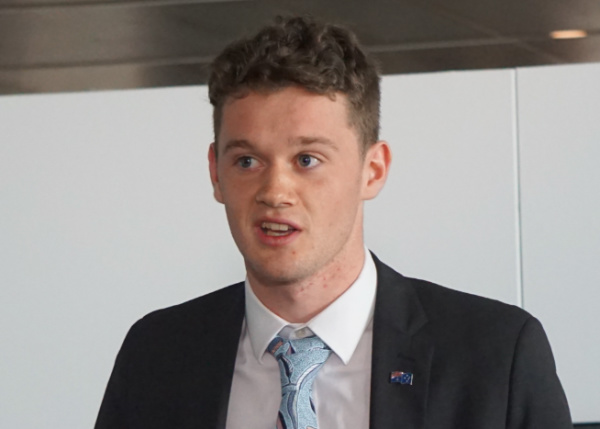Some two-thirds of young people in Australia believe the country is not doing enough to reduce carbon emissions – but almost 90 per cent don’t feel like or don’t know if government leaders listen to them, according to the findings of a new survey.

YOUNGER VOICES
Alex Matters, 19, is from South Australia, but studying in Canberra. Following is part of an interview he undertook with World Vision Australia after the survey…
What first-hand experiences have you had with disasters in your own area?
“Living in the Adelaide Hills, I have been close to various bushfires throughout the years. One that burnt down the hill in Brownhill Creek was particularly concerning, with helicopters and water bombers flying low overhead. We have had to prepare for ember attack and evacuated on occasion due to fires in the nearby national park. During last summer’s fires in the Adelaide Hills my grandpa’s paddock burnt. The event was terrible as his shed, fences and trees came down. Clearing the trees fallen on fences took a lot of work. However, compared to the devastation that others endured we got off quite lightly.”
How well prepared did you feel for those events?
“Our family always prepares in advance of bushfire season. We have milk containers around the house full of water, and make sure we know our bushfire plan. However, with our location and proximity to the national park we can always be on edge during the catastrophic days. It seems that our preparation is moving forward every year, as the bushfire season increases in length. I don’t think anyone can be truly prepared to see the fireground after it moved through. The black, hot ground, charred corpses of animals and smouldering, collapsing trees is all pretty heartbreaking.”
What message do you have for the government regarding climate change?
“Climate change is an extraordinary issue that requires an extraordinary response. First year economics tells you that there are some externalities far too large for the free market to solve. It is the duty and obligation of governments to step in and ensure that our generation is not the first in history to enter a world worse off than their parents. Wealth and affluence are nothing in the shadow of the world in which we live.”
Why is it important to you that government leaders listen to young people?
“Young people will have to clean up the mess left behind. But before we can do that we shall be bearing the brunt of it. Significantly, we are not simply calling for action or protesting inaction, we have been presenting solutions. Invariably, we are dismissed and ignored. This is all to the detriment of both the nation and the planet.”
The ‘Our World, Our Say’ survey – an initiative led by the Australian Institute for Disaster Resilience and World Vision Australia with the support of UNICEF Australia, Plan International, Save the Children, Oaktree and Australian Red Cross – involved almost 1,500 children and young adults aged 10 to 24.
It found that 67 per cent of young people don’t believe Australia is doing enough to reduce carbon emissions and that 78 per cent were concerned or extremely concerned about climate change while 73 per cent were either concerned or extremely concerned about experiencing a disaster.
Yet the survey also found that only 13 per cent of young people felt they were listened to by government leaders, either sometimes or consistently. This compared with 53 per cent saying they felt listened to by teachers and 68 per cent by parents.
Some 88 per cent of young people surveyed thought they should learn more about natural hazards and how to reduce the risk of disaster.
“Young people are telling Australia that they feel unprepared, under-educated, concerned and increasingly scared by the prospect of a disaster…” says a report on the survey’s results.
The poll also shows that while 76 per cent of young people indicated they had learnt about earthquakes at school, only 71 per cent said they had learnt about bushfires, 68 per cent about floods and 60 per cent about droughts or water shortages.
“Young people find themselves being taught more about earthquakes than the hazards that present the most risk to them as Australians, like floods or bushfires,” said the report.
Other findings revealed that the chief concerns of young people when it came to climate change include “extinction of plants and animals” followed by “liveability of planet”, “natural hazards and extreme weather”, “increased temperatures”, “air pollution” and “water shortages or drought” – all of which were identified by more than 70 per cent of respondants as climate change concerns.
The survey also showed that young people are taking steps to directly address climate change with two-thirds indicating they or their family had switched to reusable water bottles and coffee cups. More than 60 per cent said they had avoided spending money on things they didn’t need and about 60 per cent indicated they had worked to reduce household waste.
But just 34 per cent indicated they had heard of The Paris Climate Agreement and 26 per cent said they had heard of the Sustainable Development Goals – two of the key global initiatives addressing climate change.
A panel of young people, which helped to analyse the results of the survey, said that, in summary, young people felt “unprepared, uneducated, concerned and increasingly scared by the prospect of a natural disaster”, and wanted to “reduce the intensity and frequency of disasters through climate action”.
“We anticipate that we will experience personal impacts from natural hazards in the future, whether we are living in capital cities, regional centres, or rural areas,” they said. “The 2020 bushfires demonstrated that you need not live in the bush to be affected by a bushfire. We are experiencing these persistent worries while having to contend with life, school, growing up and everything else that comes with being a young person in Australia.”






